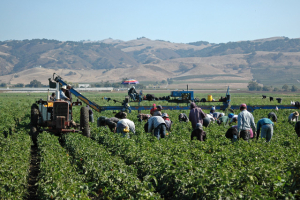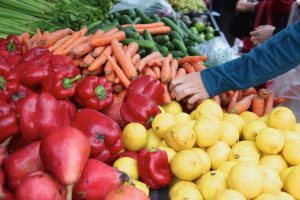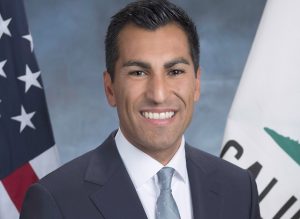PlacerGROWN Food and Farm Conference
February 14, 2009 Michael R. DimockOn Feb. 7, I had the opportunity to give the keynote address at the PlacerGROWN Food and Farm Conference. My thanks to Rich Peterson, Roger Ingram and the Board of Placer Grown for inviting me to share with the PlacerGrown community. I also want to thank Janet Moranda for putting me up at her lovely BandB near Lincoln Oaks. You can find the full text of my remarks below.
What is to be done?
It is always stimulating and instructive for me to dialog with those, whom I believe, are engaged in the most important task on the planet. Working with nature to produce food is the basis of life and doing this well is art, science and sacred. It is also very hard work, as I know from my brief time farming vegetables and flowers in Sonoma County in the mid 1990s.
We live in momentous times, when uncertainty and fear for the future predominate. Fear is a rational response when economic collapse is made further complex by two wars, gridlock in Sacramento and Washington DC, drought in California, a national health care crisis, and a diabetes epidemic that will render life spans of the next generation shorter than our own. It is perhaps sad, or maybe advantageous that those working in small scale farming and ranching have been long living under difficult conditions.
So this morning I’d like to take up a question: given the tenacious entrepreneurial spirit of those farming in the region at smaller scales, who work the most direct lines of trade with consumers, who seek to be distinguished from the mass commoditized supply chains, just what is to be done in these times to turn lemons into lemonade?
Before offering my answer to that question, I want to provide a bit more information that will illuminate my frame of reference and clarify the reasons behind my proposed response to the times.
As you know I work for Roots of Change. Prior to reading the program, who in this room had actually even heard of this organization? … Not Bad!
Let me tell you briefly about our purpose and progress. Roots of Change, or ROC as we call it, is a collaborative of diverse leaders and institutions unified in common pursuit of a sustainable food system in California by 2030. By sustainable, we mean capable of remaining perpetual. Such a system will allow the state to continue providing nearly half the nation’s fruits, nuts, and vegetables continuously and will thus require that ecosystems and resources from which food is grown to remain abundant and viable. This system will maintain the health of the people, animals, and plants within it. The economics underlying the system will allow workers, owners, and investors to live and profit at a level that maintains their participation and commitment to continuous improvement of the system. Simply put, the system must not continue to be so self-destructive. This is a rather complex concept to communicate, but even harder to make real.
We do know that sustainability is not a static place. It is a dynamic interaction in which humans seek to surf natural forces, to leverage production potential today with out degrading our ability to keep leveraging that potential forever. Sustainability also requires that we adapt to forces that dwarf our power, like drought, climate change, or fire. Our understanding of sustainability must and will evolve as we learn more and more.
Many producers, organizations, policymakers and business leaders are aligned in a general way around the idea of a sustainable food system. But most work in silos with little linkage or coordination. From time to time a tactical alliance emerges for a brief time, but never has there been a truly strategic alliance that could optimize the capacity of this emerging movement.
ROC is attempting to rally the troops from an array of subcultures working on related issues: slow food, mainstream agriculture, local food, organic agriculture, UC Coop Extension, school gardens and school lunch, sustainable agriculture, good food access, green jobs, slow money or patient capital, government, and health. We are linking these folks in an effort to sort out inefficiencies and to provide monetary and other incentives for people to dovetail or align actions and build synergy and impact.
We actually have a comprehensive strategy called California’s Campaign for a New Mainstream in Food, Farms and Fisheries, which can be found on ROC’s homepage. We do this by bringing people together to meet and plan, we do this by providing fellowships and grants to people and organization from our own budget and by writing grants for organizations committed to objectives in that strategy. Last year we raised $1.3 million for allied organizations and spent another $1.1 million on our own to support the formation of a united California seeking a sustainable food system. We have momentum and it is accelerating. Why?
Well, we all know why if we listen to the news: peak oil is here or almost here and our current food production system is based on oil. Climate change is here and our current energy sources are making the problem worse. People in the developed world are overweight and our modern diets and lifestyles are the prime causes. Increasing numbers of consumers fear chemicals in their food and illness from food. The conflicts between the society’s environmental goals and desire for cheap food have reached crisis proportions. If history tells us anything it tells us that humans can respond to crisis. ROC is but one manifestation of the crisis and an indicator of the maturing state of the good food movement.
So let me switch gears now and answer the question: what is to be done to increase success in hard times? And let me stress that if you look at natural history and human history you see that the big changes happen in brief moments. Something in the context changes and a species begins to dominate an ecosystem because it is better adapted. A human gets ill and changes their lifestyle. So when such a moment of context shift occurs, we have a duty to lean into and shape the new world it allows. We are in one of those moments now. I have five suggestions for your consideration:
First, I urge us all to maintain hope and vision for a brighter future because there is evidence and rational deduction supports the prognosis that opportunity abounds for quality niche producers tied to a specific place, and who are aligned with what is emergent in the world. Furthermore, to borrow a crude metaphor from the movies, if niche producers are a small force under siege by a hostile commodity marketplace, the cavalry is on the way in the form of the good food movement. Although still relatively small, this force for change is growing rapidly.
Consider this: 8 million people now read fifty two Edible Community publications. These magazines are growing when most of publishing is dying, because Edible Publications are focused on place and quality producers like you. Today, 800,000 people are reading a blog called Grist.org and the top stories are usually about food. A site called FoodDemocracyNow.org has had 85,000 people sign on to ask the Obama Administration to appoint leaders of the sustainable food movement to USDA’s top positions. In four short months, six thousand Californians have signed up for the Changemakers Network organized by Roots of Change. We believe the Changemaker Network will contain 20,000 people by the end of this year and if we are able to augment our budget it could be substantially larger.
These are not just “do-nothings.” People join the Changemakers Network with the hope of receiving a continuous flow of email invitations to act in support of a food system characterized by producers like you and foods like those coming out of this region and your operations. This week we asked them call the Senate to improve the economic recovery act by increasing money for the USDA microenterprise program that assists producers like you. So keep the faith, join our Changemakers Network and join with consumers, communities, and other producers up and down the State who seek to act with you to create a better regulatory and market environment for you. So maintain your hope and perseverance. More help is on the way.
The second thing you can do is to join forces with the like-minded folks from ROC’s network, the Slow Food movement, the health and food access communities and with them be bold and pushy with local government. The time has come for farmers, ranchers, and their customers to demand local policies that support the economic prosperity of small producers: preferential buying by school districts, hospitals, and prisons; land use laws that support agricultural tourism; health laws that allow small producers to sell their products directly and without ridiculously burdensome standards of hygiene. Every city in this state should build permanent covered sites for farmers markets. Every farmers market should accept EBT cards. Every WIC center should provide local products and special CSA boxes to their clients. Every county or small group of counties should find economic development money for small scale meat processing, canning, and other forms of high value packaging and perhaps even solar powered coolers for distribution nodes.
Every city already thinks about its watershed, so now the moment has come to have every city think about its food shed. For this to happen local movements must engage policy makers. ROC has gotten the Mayor of San Francisco and the State Secretary of Agriculture to host a series of dialogs about formation of a San Francisco food shed that will foster the success of regional producers.
Third, and this relates to the second. Hammer on the state, particularly the Secretary of Food and Agriculture, AG Kawamura. He initiated the California Ag Vision process, which I am glad to say was deeply influenced by ROC’s strategy. But now it is only a vision. This spring, the Secretary should begin defining a legislative agenda. He needs to hear what you need. What statewide policies would make your life easier? Let him know and let ROC know. Perhaps even more interesting is the fact that the State Senate has reoriented the Food and Agriculture Committee with four areas of policy interest: sustainable agriculture, food safety, food access, and animal welfare. Now for some, this could appear very scary because non-rural interests control the Committee. I sense that this Committee signals the end of mainstream agriculture’s dominance of agriculture policy in the State. It is an echo from the recent Proposition 2 battle. The secret to success for you and for ROC is that this Committee craft legislation that does not kill agriculture out of its hope to reshape a more sustainable food system. If we want more focus on local and regional, more on safe food that is affordable to low income folks, and want exemplary treatment of animals, we need a path to progress that provides already stressed farming operations with a safety net. I say let’s not fear this moment or this Committee, but let us weigh in with gusto and frame the political discourse in way that provides a social rationale for public investment in a healthy food system.
Fourth, and this may prove the most controversial suggestion, producers should consider forming business alliances in the form of cooperatives, LLCs, or contracted value chains. I know that in recent decades the trend has been toward divergence and singularity. But, the economic context and the growing demand and need for scale calls us to reorient and rethink business structures. ROC would like to help with this. We have some great thinkers, entrepreneurs, and capitalists in it network. This year we were instrumental in linking one of our ROC fellows to over $200,000 in private, patient investment capital that has allowed him to expand his grass fed beef hot dog business called Let’s Be Frank.
Finally, I want you all to help ROC to reframe how the nation thinks about agriculture and food. We looked at the nation’s attitudes, or should I say lack of focus on food and agriculture when compared to other issues and realized we needed a different way of igniting the American citizens’ commitment to the welfare of farmers, ranchers, rural regions and the resources from which all food must emerge. We reached out to some seminal thinkers that care about you and the future and we worked with them to draft a declaration. It is called the Declaration for Healthy Food and Agriculture. It contains a preamble, 12 principles and a call to action. I am hoping that all of you will sign it. We are working with a foundation and other organizations to mount a campaign to attract 1 million endorsements. This Declaration is a new lens for the mass public to see the central value of agriculture to our common future. In the small session later I will talk more about this and other on-the-ground ROC activities.
So in conclusion, and I hope we have time to dialog a bit, I want to say that you and your lives and work are aligned with an emerging world that becomes more regionally focused, where city and country realize more vividly their interdependence based on resources and money flows. It is like a mythic battle, there comes a moment when the advantage shifts from one side to the other.
Until the last two years the industrial food system had all the momentum and power. But the context has changed. Think about the history of the planet and the demise of the big reptiles. The meteorite has hit the planet, perhaps two have hit. One is called carbon pollution and the other financial illiquidity. Now the big dinosaurs are at threat of extinction. Many will perish and in their place will come a diversity of new localized species of food producer that is completely adapted to the regional marketplace, delivering trusted, quality food that is pumping money into the local economy. It won’t happen overnight, but the trend is real. Keep the faith and thank you for listening.



